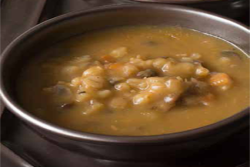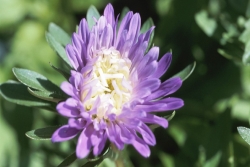Vegetarian Mushroom Barley Soup
One favorite dish of the Ashkenazim that survived the move from the shtetl to North America was the hearty mushroom-potato-barley soup called krupnick.
Galilee Diary: Why is This Night Different?
"Tu" (the Hebrew abbreviation of 15th) in the month of Shvat was set (Hillel's opinion generally overrules Shammai's) as the beginning of the tithable year for tree fruit: Calculating the tithe on fruit starts again for fruit that sets after that date.
Happy Tu BiShvat: Environmental Responsibility in the Berkshires
Planting and Parenting: The Lessons of Tu BiShvat
Here is the quintessential Jewish question: How do we emulate God? We are told that we were created by God. We are told that we have a divine spark within us.
At Tu BiShvat, Digging for Spiritual Growth
While my neighbors were putting their Christmas trees to the curb, in what seems like a ritual of replacement, I was preparing to plant for Tu BiShvat.
Those Who Plant Will Reap: A Tu BiShvat Lesson
Tu BiShvat is a reminder that we spend our lives planting seeds. Time and effort are needed for our efforts to bear fruit. Wait patiently. One day, like the seed, we will be blessed.
Planting a Seed
By Joshua Weinberg
“And when you come into the Land, and have planted all manner of food bearing trees… (Lev. 19:23) The Holy one Blessed be he said to the people Israel: Even though you have found [the land] full of plenty, you shall not say: We shall sit and not plant, rather proceed with caution in your planting… For as you have entered and found the fruits of others’ labor, you so shall plant for your children. (Midrash Tanhuma)
If you’re like me, then you may remember that pivotal moment of Jewish education when you received your very own Jewish National Fund (JNF) certificate for a tree planted in Israel. Whether it was for a birth, birthday, bar/bat mitzvah, or in memory of a loved one, a tree was planted in Israel to mark the occasion. The message was clear: with every passing milestone we want to connect Jews to the Land of Israel and to the Zionist enterprise. All of us who were the fortunate recipients of such trees knew in the recesses of our mind that somewhere in that strip of land, in some forest, was our tree, our little piece of Israel. As the certificates read, the JNF wished us the following: “We wish you the fortune of seeing it grow with much pleasure and ease.”







